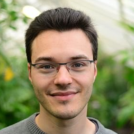We are developing a platform for studying protein dielectrophoresis at the single-molecule level. Your research will be focused on using nanogap dielectrophoresis for trapping single protein molecules and building an understanding of this trapping phenomenon. Are you passionate about single-molecule biophysics and this research? The PhD will involve a lot of complex optical measurements with advanced custom-built microscopy, handling protein samples, surface chemistry and working with electric signals to trap and study the protein dielectrophoresis. These activities must be something that you are eager to master and to spend time on, please elaborate on this in the motivation letter. We have all you need to execute your ambitious research: cleanroom facilities, optical, electronic and chemical labs and most importantly lots of fun people to work with.
Competences you will develop during your PhD with us:
- Advanced optics; we will study the molecules in our traps using custom-made light scattering microscope.
- Electrodynamics; for engineering of the electric tweezers and understanding the behavior of the analyte molecules.
- Surface chemistry (basics)
- Data analysis
- Measurement automation
- Scientific writing
- Soft skills (presentation skills, time management, teamwork)
- Supervision of students and teaching skills
Information and application
Are you interested in this position? Please send your application via the 'Apply now' button below before January 15, 2026, and include:
- A detailed Curriculum Vitae including your publications, awards, and working experience. Your CV should demonstrate the scope of your work and education and indicate a good fit with the stated requirements for the position.
- A motivation letter, emphasising your specific(personal) interest and motivation to do a PhD on the described topic.
- An academic transcript of BSc and MSc education, including grades.
- A short description of your MSc thesis/final project.
- References (contact information) of two scientific staff members (one of whom should be the supervisor of your MSc thesis/final project) who are willing to provide a recommendation letter at our request.
A note on using LLMs to assist in writing your motivation letter. Consider this fact: these days > 90% of the motivation letters are written using LLMs and most of them will not be shortlisted due to being alike to the other motivation letters written by an LLM. You can surely use LLMs for feedback on grammar and structure of your application, but be mindful in giving it too much leeway in editing your documents, it may harm your chances of being hired.
For more information regarding this position, you are welcome to contact Sergii Pud via the following email address: s.pud@utwente.nl.
The intended starting date is around April 1, 2026.
Screening is part of the selection procedure.
About the organisation
The faculty of Electrical Engineering, Mathematics and Computer Science (EEMCS) uses mathematics, electronics and computer technology to contribute to the development of Information and Communication Technology (ICT). With ICT present in almost every device and product we use nowadays, we embrace our role as contributors to a broad range of societal activities and as pioneers of tomorrow's digital society. As part of a tech university that aims to shape society, individuals and connections, our faculty works together intensively with industrial partners and researchers in the Netherlands and abroad, and conducts extensive research for external commissioning parties and funders. Our research has a high profile both in the Netherlands and internationally. It has been accommodated in three multidisciplinary UT research institutes: Mesa+ Institute, TechMed Centre and Digital Society Institute.




